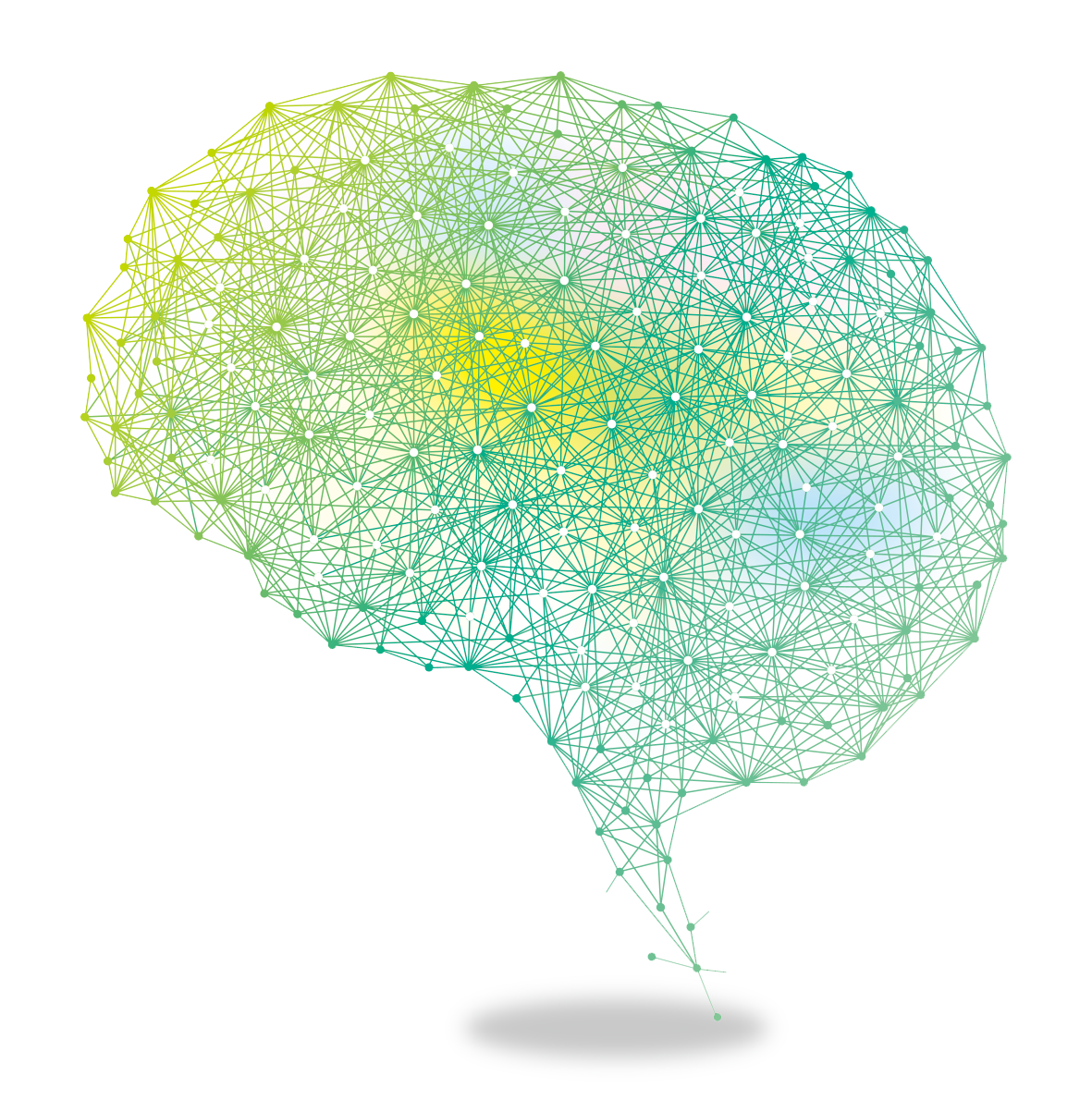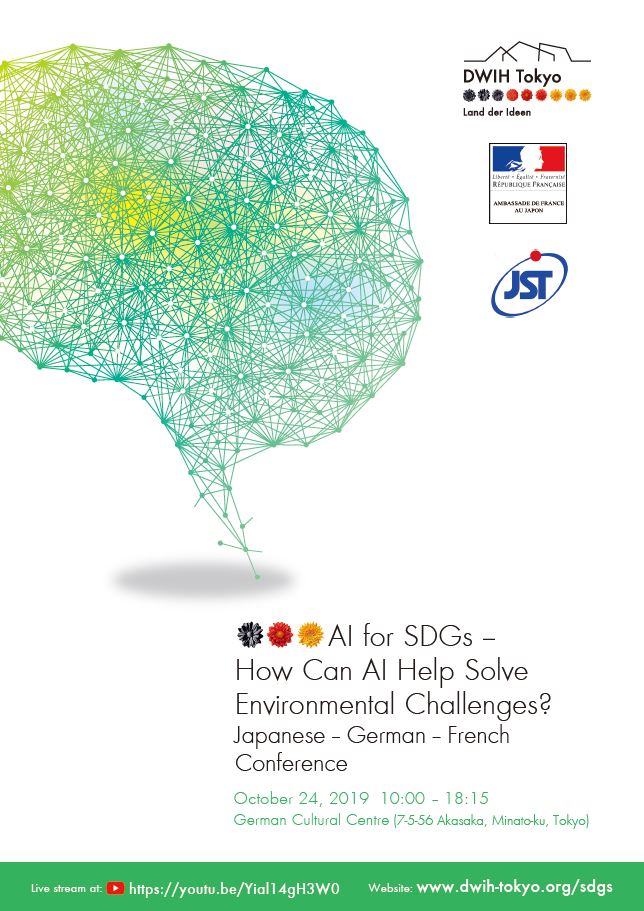AI for SDGs - How Can AI Help Solve Environmental Challenges?
 © iStock
© iStock
Event Information
October 24, 2019, 10:00 AM to 6:15 PM
German Cultural Centre (OAG Haus), 7-5-56 Akasaka, Minato-ku, Tokyo 107-0052
Organizer(s): DWIH Tokyo, French Embassy to Japan, Japan Science and Technology Agency (JST)
With more than 150 participants from Japan, Germany and France, our trilateral conference on Artificial Intelligence for SDGs in Tokyo was a great success. We would like to express our thanks to everyone for the great support!
You can find the following documentation material here:
- a report about the conference
- a photo gallery of the conference (©DWIH Tokyo)
- video (livestream) of the conference: here
- presentations (please find them in the abstracts below)
We also publish the updates on the conference and recent media coverage on the DWIH Tokyo Twitter account.
Japanese – German – French Conference:
AI for SDGs – How Can AI Help Solve Environmental Challenges?
 As global temperatures continue to rise, and as we witness the impact of climate change on water availability, weather patterns, and natural disasters, discussions about what can be done continue to heat up as well. And as computers get smarter, scientists, policymakers and business people look at new ways to enlist their help in environmental protection. This is why discussions on how Artificial Intelligence (AI) systems can help to deal with climate change, to develop sustainable cities and to provide clean affordable energy are steadily intensifying.
As global temperatures continue to rise, and as we witness the impact of climate change on water availability, weather patterns, and natural disasters, discussions about what can be done continue to heat up as well. And as computers get smarter, scientists, policymakers and business people look at new ways to enlist their help in environmental protection. This is why discussions on how Artificial Intelligence (AI) systems can help to deal with climate change, to develop sustainable cities and to provide clean affordable energy are steadily intensifying.
Reflecting the fact that environmental issues affect the entire globe, the United Nations Sustainable Development Goals (SDGs), adopted in 2015 and setting global targets for 2030, also include goals relating to environmental challenges. Five of the 17 SDGs call directly on humanity to actively prevent environmental degradation: providing clean and affordable energy (7), developing sustainable cities (11), combating climate change (13), using ocean and marine resources wisely (14), sustainably managing forests (15).
During the trilateral DWIH conference on October 24th – the United Nations Day – speakers from Germany, Japan and France will gather in Tokyo to share insights into the potential of AI to combat environmental challenges. Their topics range from sustainable land use and smart agriculture to smart cities and transport systems. The event is open to the public and targets experts from science, industry and policy-making backgrounds.
Organizer: German Centre for Research and Innovation Tokyo (DWIH Tokyo)
Co-organizer: French Embassy to Japan; Japan Science and Technology Agency (JST)
Patronage: Federal Republic of Germany Foreign Office; Federal Ministry of Education and Research
Supported by: Japan Society for the Promotion of Science (JSPS); Institute for Future Initiatives, The University of Tokyo; Official DWIH Tokyo partners from Germany
Language: English (Japanese interpretation available)
This conference is a follow-up of the “Artificial Intelligence – International Research and Applications: 1st Japanese-German-French DWIH Symposium” (Nov 2018), during which participants issued a joint statement on intensified collaboration in AI.
Programme
| 10:00 – 10:15 | Opening Remarks & Greetings
Dorothea MAHNKE, Director, German Centre for Research and Innovation Tokyo (DWIH Tokyo) |
| 10:15 – 11:15 | Session 1: National AI Strategies & Environmental Challenges: How to Implement Them?
Chair: Dr. Yuko HARAYAMA, Former Executive Member of the Council for Science and Technology Policy, Cabinet Office, Government of Japan; Professor Emeritus, Tohoku University “Localizing SDGs – Circulating and Ecological Economy –” |
| 11:15 – 11:30 | Coffee Break |
| 11:30 – 13:00 | Session 2: AI Applications to Tackle Climate Change – Sustainable Land Use & Smart Agriculture
Chair: Prof. Dr. Wolfgang KETTER, Director of the Institute of Energy Economics and Chaired Professor of Information Systems, University of Cologne “AI in Agriculture for Tackling Environmental Challenges” |
| 13:00 – 14:15 | Lunch (Sustainable Catering / “Mottainai Catering”) |
| 14:15 – 15:45 | Session 3: AI Applications to Tackle Climate Change – Smart Cities & Smart Homes
Chair: Prof. Dr. Arisa EMA, Assistant Professor, Institute for Future Initiatives, The University of Tokyo “(R)evolutions in Mobility: A CASE for Using AI and Smart Markets to Create Sustainable Cities” |
| 15:45 – 16:15 | Coffee Break |
| 16:15 – 18:00 | Panel Discussion: AI Game Changers for the Earth – Challenges, Risks & Future Opportunities
Chair: Prof. Christophe CÉRIN, Professor in Computer Science and Engineering, LIPN, CNRS UMR 7030, Université Paris 13 “Virtual Power Plant (VPP) Demonstration Project Activities of Tohoku Electric Power and NEXT Kraftwerke” |
| 18:00 – 18:15 | Concluding Remarks
Prof. Dr. Arisa EMA, Assistant Professor, Institute for Future Initiatives, The University of Tokyo |
Abstracts - Session 1: National AI Strategies & Environmental Challenges: How to Implement Them?
Chair: Dr. Yuko HARAYAMA, Former Executive Member of the Council for Science and echnology Policy, Cabinet Office, Government of Japan; Professor Emeritus, Tohoku University
Dr. Kotaro KAWAMATA, Director, Environmental Policy Bureau, Ministry of the Environment, Government of Japan
“Localizing SDGs – Circulating and Ecological Economy –” [PDF, 4192 KB]
Japanese government has been promoting the “Circulating and Ecological Economy”, or CEE, to reflect the philosophy of the 2030 Agenda and achieve the SDGs. Japan has started a new programme and provided support for local governments to vitalize local resources and economies. By connecting municipalities with experts to find the most effective way to cope with social, environmental, and economic issues, this programme will translate the principles of CEE into reality. “Society 5.0”, including AI, is expected to contribute to this.
Dr. Lothar MENNICKEN, Counselor, Science and Technology, Embassy of the Federal Republic of Germany in Japan
“German AI Initiatives – Using Digital Technologies for Sustainable Solutions” [PDF; 1002 KB]
Germany wants to become a pioneer in achieving the Agenda 2030 SDGs by implementing the National Sustainable Development Strategy. R&D funded by the Federal Ministry of Education and Research will contribute to sustainable innovations in energy supply, circular economy, mobility and agriculture by increasing resource efficiency through new digital technologies, processes and services. Applying knowledge of sustainability research to make the digital transformation itself more sustainable is a major goal.
Renaud FRANCOU, Foresighter, Author, Former Project Manager at Fondation Internet Nouvelle Génération (FING)
“Making the Digital and Environmental Transitions Converge” [PDF; 1192 KB]
The environmental transition sets an inevitable time frame for our societies, while the digital transition is the driving force of our times. The environmental transition has a clear goal but is straining to find a way, while the digital transition is affecting everyday life and impelling change but without any clear collective goal.
The one has a goal to reach; the other, a way to go. They need each other! How to make these two major transitions converge? How can artificial intelligence help?
Abstracts - Session 2: AI Applications to Tackle Climate Change – Part I Sustainable Land Use & Smart Agriculture
Chair: Prof. Dr. Wolfgang KETTER, Director of the Institute of Energy Economics and Chaired Professor of Information Systems, University of Cologne
Prof. Frédérick GARCIA, INRA research director, MIA (Applied Mathematics and Informatics), INRA, Toulouse
“AI in Agriculture for Tackling Environmental Challenges” [PDF; 2885 KB]
Artificial Intelligence (knowledge representation, machine learning, automated decision making…) is at the heart of the digital transformation of agriculture. After introducing the new methods and technologies which characterise digital agriculture, I will focus on the potential of AI in agriculture for tackling environmental challenges. I will conclude by having a look at the limitations and the environmental impacts of AI and digital agriculture.
Dr. Eisaku SHIRATANI, Vice President, National Agriculture and Food Research Organization (NARO), Japan
“Smart Agri-Food Industry for Climate Change Mitigation/Adaptation in Japan”
This talk will provide an overview of NARO’s research. ICT technologies for smart agriculture, such as selfdriving agrimachines, have been developed. Technologies of impact assessment, mitigation, and adaptation for climate change, such as a system that provides 1 km grid-square agro-meteorological data, and a disaster prevention support system for irrigation ponds have also been developed. Through the development of these technologies, NARO intends to strengthen the competitiveness of the agri-food industry in Japan.
Prof. Dr.-Ing. Cornelia WELTZIEN, Director, Leibniz Institute for Agricultural Engineering and Bioeconomy (ATB) ; Professor, Technical University Berlin (TUB)
“AI Applications – Leading the Way to an Environment Controlled Agriculture!?” [PDF; 1993 KB]
Future farms will engage in sustainable and environmentally friendly production, but in a manner as efficient as mass-production. They will carry out many small-scale and precise interventions as efficiently as one largescale intervention. These intelligent farms will employ IoT, cloud computing, and AI tools, exploiting collective data and knowledge to improve agricultural decision making, as well as contributing to collective data and knowledge bases. AI will lead the way to an Environment Controlled Agriculture.
Abstracts - Session 3: AI Applications to Tackle Climate Change – Part II Smart Cities & Smart Homes
Chair: Prof. Dr. Arisa EMA, Assistant Professor, Institute for Future Initiatives, The University of Tokyo
Prof. Dr. Wolfgang KETTER, Director of the Institute of Energy Economics and Chaired Professor of Information Systems, University of Cologne
“(R)evolutions in Mobility: A CASE for Using AI and Smart Markets to Create Sustainable Cities”
Urban populations lead the way in adopting smart tech. Urban areas can also facilitate positive change with municipal policy. The transition to sustainable energy and smart cities is wickedly complex, tempting business and policymakers with growth, but offering a minefield of unintended consequences. As artificial intelligence and machine learning enable Connected, Autonomous, Shared and Electric (CASE) mobility, how can we use the power of smart markets to create sustainable, fair and liveable cities?
Prof. Christophe CÉRIN, Professor in Computer Science and Engineering, LIPN, CNRS UMR 7030, Université Paris 13
“AI for Smart Buildings” [PDF; 1434 KB]
What is the difference between an Intelligent Building and a Smart Building? What is the difference between a Building Management System and a Cyber Physical System? In the jungle of terminology, the computerscientist-in-chief will try to convince you that (computer) systems that leverage purely theoretical views are the source of better energy management, thanks to AI. A difficulty must be confronted in the ubiquitous world of cloud computing: more than a panacea, cloud is a reality.
Prof. Dr. Masaru YARIME, Associate Professor, Division of Public Policy, Hong Kong University of Science and Technology; Visiting Associate Professor, Graduate School of Public Policy, The University of Tokyo
“AI-Based Innovation to Tackle Climate Change: Technological Opportunities and Institutional Challenges in Smart Cities in Japan” [PDF; 5229 KB]
Smart cities play an important role in tackling climate change by promoting renewable energy sources and improving energy efficiency while strengthening resilience against natural disasters. At the same time, it is crucial to address societal concerns concerning privacy, safety, and public security in managing a vast amount of sensitive data. We will discuss policy and institutional challenges in governing AI-based innovation through open data and stakeholder collaboration in Japan and beyond.
Abstracts - Panel Discussion: AI Game Changers for the Earth – Challenges, Risks & Future Opportunities
Chair: Prof. Christophe CÉRIN, Professor in Computer Science and Engineering, LIPN, CNRS UMR 7030, Université Paris 13
Jochen SCHWILL, CEO, NEXT Kraftwerke, Germany
Hirobumi WADA, General Manager, Office of Digital Innovation Promotion, Tohoku Electric Power Co., Inc.
“Virtual Power Plant (VPP) Demonstration Project Activities of Tohoku Electric Power and NEXT Kraftwerke” [PDF; 1900 KB]
“VPP demonstration project of Tohoku EPCO with Next Kraftwerke” [PDF; 1688 KB]
The presentation will introduce the VPP project that Tohoku Electric Power has been working on with Next Kraftwerke, offering remote control of generators belonging to corporate customers and the batteries of local governments and households. The use of AI technology necessitates the prediction of electricity load and PV output, and optimization based on such data. In addition, use cases of AI for the optimal energy management system and power plant facilities inspection will be introduced.
Dr. Peter HOFFMANN, Senior Scientist, Climate Service Center Germany (GERICS), Helmholtz-Zentrum Geesthacht
“How Can Machine Learning Algorithms Be Used to Develop Innovative Climate Service Products?” [PDF; 2430 KB]
With the increasing amount of climate change data and information, climate service developers are faced with the task of efficiently integrating and analysing large datasets coming from a multitude of sources to develop innovative climate service products. Machine Learning algorithms are helpful tools that are increasingly used to achieve this goal, but their full potential and guidelines for quality assurance need to be explored and extended. Consequently, expert networks should be established.
Prof. Dr. Bahareh KAMRANZAD, Assistant Professor, The Hakubi Center for Advanced Research and Graduate School of Advanced Integrated Studies in Human Survivability, Kyoto University
“Towards the SDGs with Ocean Renewable Energies; Application of AI in Reducing the Uncertainties for a Sustainable Development”
Renewable energies are suitable alternatives to mitigate the negative impacts of global warming. Ocean renewable energies are promising resources to provide part of the energy demand in coastal areas. However, they are affected by climate change, as well. As climate change projections with various scenarios involve a large dataset, AI can be an efficient approach to investigate the climate change impact on ocean resources by reducing the uncertainties and providing a high accuracy estimation.
Prof. Dr. Jean-Pierre VILOTTE, Scientific Deputy for Intensive Computing and Data at the CNRS-INSU ; Director of the Parallel Computing and Data Analysis Centre at Institute de Physique du Globe de Paris
“New Multi-Source Data and Machine Learning Challenges in Earth Sciences and Environmental Change Hazard Monitoring” [PDF; 14786 KB]
Understanding and monitoring environmental change hazard, together with quantifying the probability and the impact of extreme events has important societal-economical implications. Research is being accelerated by the growing wealth and diversity of multi-source data from Earth observation; data analytics, together with expanding computational capabilities. In this context, machine learning techniques are gaining increasing attention even though they are facing new challenges associated to this wealth of multi-source, multi-scale and multi-modal data. We will provide a brief overview, in the context of the CNRS-INSU, of some of these data and ML challenges, and scientific domain illustrations in the context of environmental hazard monitoring.

